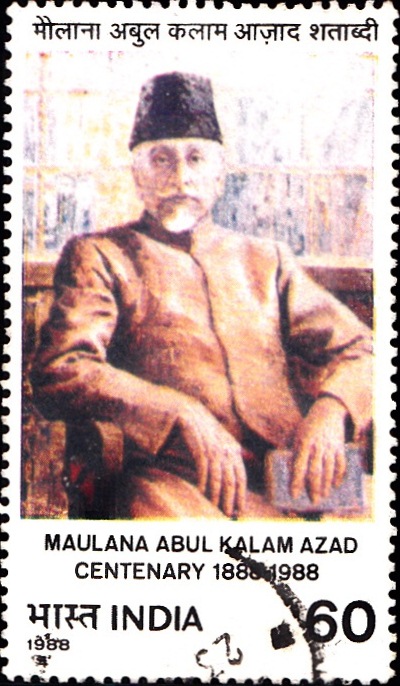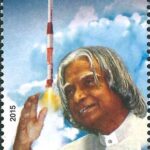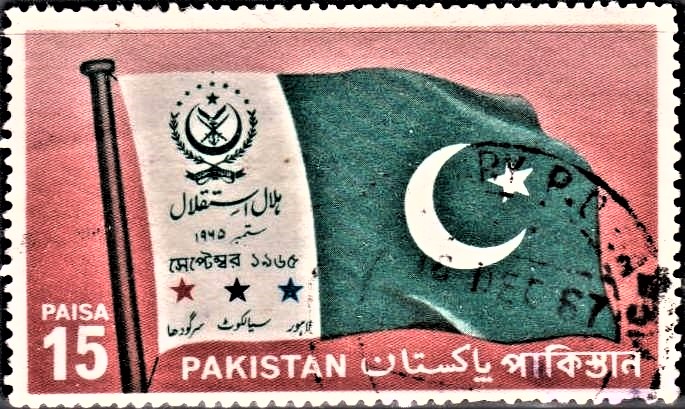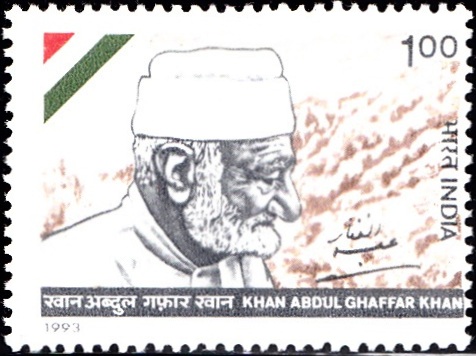
Abul Kalam Azad 1966
A commemorative postage stamp on the National Education Day : birth anniversary of Maulana Azad, first minister of education in Indian government :

 Issued by India
Issued by India
Issued on Nov 11, 1966
Issued for : On the occasion of the birthday of Maulana Abul Kalam Azad which falls on 11th November 1966, the P. & T. Department feels privileged in bringing out a special postage stamp in his memory.
Type : Block of 4 Stamps, Mint Condition
Colour : Blue Grey
Denomination : 15 Paisa
Overall Size : 3.34 X 2.88 cms.
Printing Size : 2.99 X 2.52 cms.
Perforation : 14 x 13½
Watermark : Printed on unwatermarked paper
Number Printed : 15,00,000
Number per issue sheet : 42
Printing Process : Photogravure
Designed and Printed at : India Security Press
Name : Maulana Sayyid Abul Kalam Ghulam Muhiyuddin Ahmed Azad
Born on Nov 11, 1888 at Mecca, Saudi Arabia
Died on Feb 22, 1958 at Delhi, India
About :
- A great divine, a great scholar, a great orator and a great fighter for national freedom, Maulana Abul Kalam Azad came of a family of religious divines of Delhi and was born in Mecca in 1888. Being the son of a religious leader deeply committed to the oriental way of life, he received his early education directly under his father in the traditional manner. He attained eminence as a brilliant writer and theologian in his early age. Essentially a scholar, the spirit of free enquiry and the search for truth with which he was imbued from his very youth soon led him into the political firmament as he strongly felt that man could attain true and full development only in an atmosphere of freedom. Thus from his early twenties he became a crusader for India‘s Independence and his contribution to the cause of Indian nationalism has been widely acknowledged.
- Apart from his contribution to the Indian National struggle, Maulana Azad was also an outspoken champion of rationalism and progressiveness in all spheres of Indian life. He sought to approach religious, moral, social, economic and political questions from a detached and dispassionate point of view and worked for securing justice and fair play for all sections of the Indian people.
- Maulana Azad proclaimed his political credo in ‘Al-Hilal‘ which first appeared in 1912. As a mere literary effort it was something unique in the history of Urdu language and literature. It was endowed with a rare combination of rhetoric and eloquence, of wit and poetry, of biting sarcasm and lofty idealism. All these moved the intelligentsia but what captured the imagination was the formulation of a new faith. From the very day of its inception ‘Al-Hilal‘ waged an unrelenting war against the policy of the foreign rulers to divide the Hindus and Muslims. ‘Al-Hilal‘ soon became the focus where the resurgent spirit of India found its finest expression. “It is due to the indolence of individuals that the souls of Nations sleep” – this sentence epitomises the tempo that was set through, the medium of this journal.
- When the guarantee of the Al-Hilal was confiscated by the British Govt., he started the ‘Al–Balagh‘ in 1915. The political activities continued unabated and he was interned in Ranchi in 1916. Soon after his release in January, 1920 he came in contact with Gandhiji.
- In the very first meeting with Gandhiji a bond of lasting friendship was forged between the two great souls. The period between 1920-1947 was one of strenuous struggle against British Imperialism. Maulana Azad like Gandhiji believed that good could only breed good and that evil would always spell evil. The Maulana remained in the forefront of the national struggle and was imprisoned on several occasions for long periods. In 1923 he was elected President of the Indian National Congress at the young age of 35. Maulana Azad was the spokesman of the Congress and conducted talks with Sir Stafford Cripps in 1942 and with Lord Wavell in the Simla conference in 1945. He was thus actively associated with the achievement of Independence by our country. He was elected twice as the President of the All India Congress.
- As a scholar Maulana Azad produced monumental works. Two of his works ‘Ghubari–Khatir‘ and ‘Tadhkirah‘ are masterpieces of the Urdu language. His commentary on the Holy Quran is without parallel in the realm of Moslem literature. Whatever role he was called upon to play whether in the field of literature or politics he lent to it a dignity and poise which was entirely his own.
- He was Minister of Education in the Government of India from 15th January 1947 till his death on the 22nd February 1958. A devout Muslim, he always stood for national unity and communal harmony. National spirit was the driving force of his life. Pandit Jawaharlal Nehru, Prime Minister of India, paying a tribute in the Indian Parliament on 24th February 1958 said “so we mourn today the passing of a great man, a man of luminous intelligence and a mighty intellect with an amazing capacity to pierce through a problem to its core………“








[…] the early hours of 9th August, 1942 all the top leaders, including Gandhiji, Jawaharlal Nehru and Maulana Azad, were arrested, and the Congress was declared an unlawful organization. Despite his failing health […]
[…] thought behind the establishment of the Akademi is best expressed in the words of Maulana Abul Kalam Azad, the then Union Minister of Education:“India’s precious heritage of music, drama and […]
[…] the historic meeting of All India Congress Committee, held in Bombay in 1942, presided over by Maulana Abul Kalam Azad, Mahatma Gandhi gave the slogan ‘Do or Die’ and people of India stood as one […]
[…] Ali was, along with such illustrious personalities as Maulana Abul Kalam Azad, Dr. M.A. Ansari and Hakim Ajmal Khan, among the patriotic Indian Muslims prominent in public life, […]
[…] former Union Minister for Education, Maulana Abul Kalam Azad, inaugurated the Akademi on August 5, 1954. In his inaugural speech, he stated […]
[…] Madan Mohan Malaviya, C. R. Das, Lala Lajpat Rai, Motilal Nehru, Jawaharlal Nehru, Sardar Patel, Maulana Azad, Rajendra Prasad and Rajaji. They too, in fact stayed with him whenever they visited […]